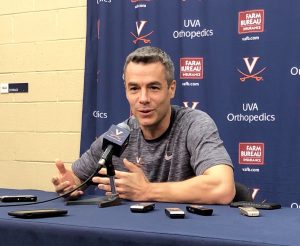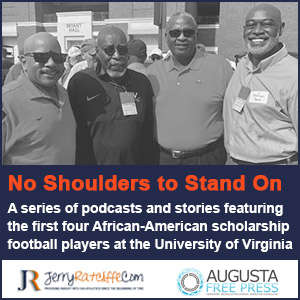Virginia Returns to the Scene of the Crime in Charlotte
By Jerry Ratcliffe
I was listening to national sports radio the other day and when the topic of last year’s NCAA Tournament came up, the host said his most memorable moment from the event was Tony Bennett’s heartfelt message after Virginia became the first No. 1 seed in history to lose to a No. 16 seed, UMBC.
This guy echoed what I had heard so many times during the aftermath of last season’s March Madness. Bennett’s humility in the face of a devastating defeat resonated across America.
Today, Bennett returns to the scene of the defeat, Charlotte’s Spectrum Center in the Queen City, the city where he spent his NBA career, the city where he met his wife.
Bring up last March and most every player and coach in Virginia’s program will quickly brush it under the rug. They’re not running from it. Quite the opposite. They’re just tired of talking about it.
Kyle Guy said back during the summer that the team has used that defeat to motivate them to work harder, to make sure it never happened to them again.
Chip on the shoulder? You bet.
That loss has helped the No. 2 Cavaliers to a 28-2 season, 16-2 in the ACC, where they repeated as regular-season champions. If you think Virginia took even its cupcake opponents lightly, think again. It is second in the nation in scoring margin (17.6 ppg), behind only Gonzaga, which plays in a much less competitive conference.
“We learned the greatest lesson that you can possibly have last season,” Guy reminded media a week ago when asked why the Cavaliers don’t let up when they’re miles ahead of a weaker foe.
The UMBC loss has followed, if not haunted this team, for nearly a year. Half the arenas the Cavaliers played in, there were always jokers sporting UMBC basketball jerseys, or students chanting UMBC. Guy & Company never flinched.
They had learned to embrace it, own it long before all the noise.

UVA coach Tony Bennett speaks with the media Tuesday.
“Everybody says you’re going back to Charlotte where you lost to UMBC,” Bennett said during his Tuesday presser at John Paul Jones Arena in Charlottesville. “We’ve tried to grow as much as we can and learn from it.
“It’s all been talked about enough,” the coach said. “It’s time to press on.”
No doubt that Bennett’s father, Dick Bennett, who coached Tony in his college career at Green Bay before moving on to coach Wisconsin to a Final Four appearance, brought up last March’s disappointment and laid it to rest during his talk to the Cavaliers in recent days.
Dick, who still lives in Wisconsin, visits Tony and his family a couple of times a year. Once in September or October (Tony laughs that it’s because it’s too cold to play golf back home at that time of year and Charlottesville’s courses offer a more comfortable venue), and usually around the tail end of basketball season.
“He’s talked to [the team] a couple of times (this season),” Tony said of his dad. “He just shared with them what he thought was important. He has a way, a wisdom and humility that very few have. I was fortunate to have been under him and trained by him, and whenever he can share something he sees, I know it comes from the right spot.”
One thing is for certain, the Cavaliers bring more firepower offensively to the postseason than any of Bennett’s teams during his 10 years at Virginia, and that is part of the reason UVA trails only Duke as odds-on favorite to win the national championship.
We all know that while the offense is what catches the eye, it’s the Cavaliers’ defense that is the blueprint of their success.
Virginia has finished the regular season with an unprecedented distinction in the history of the ACC in terms of defense. The Cavaliers have led the conference in scoring defense for an eye-popping nine consecutive years, currently giving up 56.7 points per game to league foes.
That’s never happened before. Longest stretch by any ACC team in that category was six years.
Bennett wouldn’t have it any other way. He was trained in his father’s “Pack-Line” defense, and while he has added his own wrinkles, it’s the same philosophy through and through.
All of this, of course, begins in grueling practices where defense is heavily emphasized every day. Every player that has come through Bennett’s program for the past decade knows that if you don’t play defense, then you don’t play.
“I think it’s important for a head coach and a coaching staff to be very demanding,” Bennett said. “Playing good defense isn’t always the easiest thing. It’s not human nature. Most guys aren’t wired to just be defensive.
“That’s why coaches have to push a little harder,” Bennett continued. “I remember something my father told me a long time ago. He said, ‘You’ve got to decide when you step on the practice floor, who’s going to win, you or the team.’ Meaning that defensively you’re going to have to impose what’s important to you.”
Bennett said that pushing, grinding the defensive initiative constantly can be exhausting at times for a coach.
“Sometimes you lose your cool a little bit, but I think if you have the right kind of guys, they’ll respond to that,” Bennett said. “I try to be demanding and detail oriented and make them as sound and tough minded as they can be on that side of the ball.”









